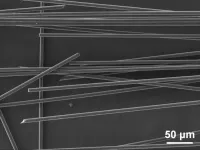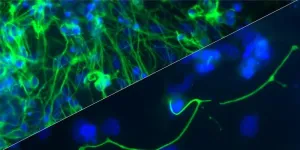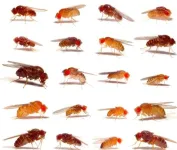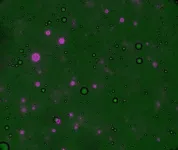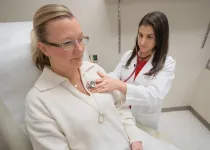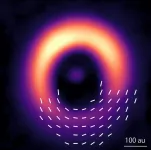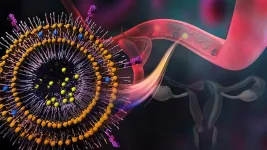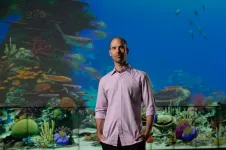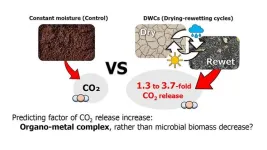Recycling the unrecyclable
2025-02-06
Epoxy resins are coatings and adhesives used in a broad range of familiar applications, such as construction, engineering and manufacturing. However, they often present a challenge to recycle or dispose of responsibly. For the first time, a team of researchers, including those from the University of Tokyo, developed a method to efficiently reclaim materials from a range of epoxy products for reuse by using a novel solid catalyst.
There’s a high chance you are surrounded by epoxy compounds as you read this. They are used in electronic devices due to their insulating ...
Alien ocean could hide signs of life from spacecraft
2025-02-06
Searching for life in alien oceans may be more difficult than scientists previously thought, even when we can sample these extraterrestrial waters directly.
A new study focusing on Enceladus, a moon of Saturn that sprays its ocean water into space through cracks in its icy surface, shows that the physics of alien oceans could prevent evidence of deep-sea life from reaching places where we can detect it.
Published today (Thursday, 6 February 2025) in Communications Earth and Environment, the study shows how Enceladus's ocean forms distinct layers that dramatically slow the movement of material ...
Research unveils new strategies to tackle atrial fibrillation, a condition linked to stroke and dementia risks
2025-02-06
A recent Brazilian study published in Nature Cardiovascular Research has highlighted promising pathways for preventing and treating atrial fibrillation, a condition that significantly raises the risks of stroke and dementia. The research was led by the Federal University of Rio de Janeiro (UFRJ) in partnership with the D’Or Institute for Research and Education (IDOR).
What Is Atrial Fibrillation?
Atrial fibrillation (AF) is the most common cardiac arrhythmia worldwide. It disrupts the normal rhythm of the heart, causing irregular and often rapid heartbeats. This condition is associated with increased risks of stroke, dementia, and heart failure. It is also linked to other health ...
Research spotlight: Researchers identify potential drug targets for future heart failure therapeutics
2025-02-06
How would you summarize your study for a lay audience?
Heart failure remains a substantial burden for patients due to its high prevalence and limited therapeutic options. Heart failure is classified into two major clinical subtypes— heart failure with preserved ejection fraction (HFpEF) and heart failure with reduced ejection fraction (HFrEF). While there have been significant therapeutic advances in HFrEF, the rate of complications and death from HFrEF remains high. Additionally, most drugs that have shown benefits for patients with HFrEF have not demonstrated a comparable benefit in patients with HFpEF, highlighting a critical need for the development of targeted therapies ...
Air pollution clouds the mind and makes everyday tasks challenging
2025-02-06
People’s ability to interpret emotions or focus on performing a task is reduced by short-term exposure to particulate matter (PM) air pollution, potentially making everyday activities, such as the weekly supermarket shop, more challenging, a new study reveals.
Scientists discovered that even brief exposure to high concentrations of PM may impair a person’s ability to focus on tasks, avoid distractions, and behave in a socially acceptable manner.
Researchers exposed study participants to either high levels of air pollution - using candle smoke - or clean air, testing cognitive abilities ...
Uncovering how developmental genes are held in a poised state
2025-02-06
Key points:
Researchers from the Voigt lab have extended our understanding of how developmental genes are held in a poised state to allow timely expression once they receive the correct ‘go’ signals.
The next layer of regulation has been uncovered by the identification of proteins that interact with the epigenetic marks that poise developmental genes ready for expression.
The research provides insight into the mechanisms through which the phenomenon of bivalency – where both activating and repressive marks are laid down at the same site on the genome – acts to ready developmental ...
Multimillion-pound research project aims to advance production of next-generation sustainable packaging
2025-02-06
A multimillion-pound research project, called SustaPack, aims to overcome manufacturing challenges for the next generation of sustainable, paper-based packaging for liquids. Backed by a £1 million grant from the Engineering and Physical Sciences Research Council (EPSRC) as part of UKRI’s co-investing programme, packaging technology company Pulpex Ltd has joined forces with the University of Surrey to refine its manufacturing processes to provide a viable solution to plastic pollution.
Contributing matching support towards the project, Pulpex has already made significant strides in the development of its patented technology, ...
‘Marine Prosperity Areas’ represent a new hope inconservation
2025-02-06
Could 2025 be the year marine protection efforts get a “glow up”? According to a team of conservation-minded researchers, including Octavio Aburto of UC San Diego’s Scripps Institution of Oceanography, the moment has arrived.
In a new study published Feb. 6 in the journal Frontiers in Marine Science, Aburto and a multinational team of marine scientists and economists unveil a comprehensive framework for Marine Prosperity Areas, or MPpAs. With a focus on prosperity—the condition ...
Warning signs may not be effective to deter cannabis use in pregnancy: Study
2025-02-06
PISCATAWAY, NJ – Warning signs at dispensaries about the potential health effects of cannabis use in pregnancy may not be effective, according to a new report in the Journal of Studies on Alcohol and Drugs, based at Rutgers University. In fact, those who are pregnant and using cannabis may actually distrust the content of warning signs altogether.
“Mandatory warning signs aren’t working,” says lead researcher Sarah C. M. Roberts, DrPH, of the University of California, San Francisco. In fact, some of the respondents “saw the signs as having stigmatizing or negative effects on pregnant people who use ...
Efforts to find alien life could be boosted by simple test that gets microbes moving
2025-02-06
Finding life in outer space is one of the great endeavors of humankind. One approach is to find motile microorganisms that can move independently, an ability that is a solid hint for life. If movement is induced by a chemical and an organism moves in response, it is known as chemotaxis.
Now, researchers in Germany have developed a new and simplified method for inducing chemotactic motility in some of Earth’s smallest life forms. They published their results in Frontiers in Astronomy and Space Sciences.
“We tested three types of microbes – two bacteria and one type of archaea – and found that they all moved toward a chemical called L-serine,” ...
Study shows some species are susceptible to broad range of viruses
2025-02-06
A study of fruit flies shows some species are highly susceptible to a wide range of viruses.
In the study – by the University of Exeter – 35 fruit fly species were exposed to 11 different viruses of diverse types.
As expected, fly species that were less affected by a certain virus also tended to respond well to related viruses.
But the findings also show “positive correlations in susceptibility” to viruses in general. In other words, fly species that were resistant to one virus were generally resistant to others – including very different ...
How life's building blocks took shape on early Earth: the limits of membraneless polyester protocell formation
2025-02-06
One leading theory on the origins of life on Earth proposes that simple chemical molecules gradually became more complex, ultimately forming protocells—primitive, non-living structures that were precursors of modern cells. A promising candidate for protocells is polyester microdroplets, which form through the simple polymerisation of alpha-hydroxy acids (αHAs), compounds believed to have accumulated on early Earth possibly formed by lightning strikes or delivered via meteorites, into protocells, followed by simple rehydration ...
Survey: Many Americans don’t know long-term risks of heart disease with pregnancy
2025-02-06
COLUMBUS, Ohio – Pregnancy-related deaths in the U.S. have risen 140% over the past three decades with heart disease a major cause, according to the American Heart Association. A new national survey commissioned by The Ohio State University Wexner Medical Center found that many Americans are not aware of the long-term risks of heart disease with pregnancy and the critical care needed before, during and after pregnancy.
“During pregnancy there are a lot of different hormone shifts that happen to accommodate growth of the baby and health of the mom. The result is that the mom’s heart rate increases along with the amount ...
Dusting for stars’ magnetic fingerprints
2025-02-06
For the first time astronomers have succeeded in observing the magnetic field around a young star where planets are thought to be forming. The team was able to use dust to measure the three-dimensional structure “fingerprint” of the magnetic field. This will help improve our understanding of planet formation.
Planets form in turbulent disks of gas and dust called protoplanetary disks around young stars. It is thought that the first step in planet formation is dust grains colliding and sticking together. The movement of ...
Relief could be on the way for UTI sufferers dealing with debilitating pain
2025-02-06
Relief could be on the way for UTI sufferers dealing with debilitating pain
New insights into what causes the painful and disruptive symptoms of urinary tract infections (UTIs) could offer hope for improved treatment.
UTIs are one of the most prevalent bacterial infections globally, with more than 400 million cases reported every year. Nearly one in three women will experience UTIs before the age of 24, and many elderly people and those with bladder issues from spinal cord injuries can experience multiple UTI’s in a single year.
Findings from a new study led by Flinders University’s ...
Testing AI with AI: Ensuring effective AI implementation in clinical practice
2025-02-06
Using a pioneering artificial intelligence platform, Flinders University researchers have assessed whether a cardiac AI tool recently trialled in South Australian hospitals actually has the potential to assist doctors and nurses to rapidly diagnose heart issues in emergency departments.
“AI is becoming more common in healthcare, but it doesn’t always fit in smoothly with the vital work of our doctors and nurses,” says Flinders University’s Dr Maria Alejandra Pinero de Plaza, who led the research.
“We need to confirm these systems are trustworthy and work ...
Researchers find improved method for treating rare, aggressive, pregnancy-related cancer
2025-02-06
PORTLAND, Ore. – A new drug delivery system shows promise for treating a rare, aggressive form of cancer affecting pregnant women and new mothers, and it has potential with other cancers as well.
Scientists led by Olena Taratula, a nanomedicine researcher at Oregon State University, have found a way to better ensure the drug used to combat the disease reaches tumor cells without damaging healthy tissue.
Findings of the study into choriocarcinoma, which occurs in the United States at a rate of about four cases per 100,000 pregnancies, ...
Half of the fish you eat comes from the Great Barrier Reef’s marine reserves
2025-02-06
A new study of the Great Barrier Reef has revealed that the network of no-take marine reserves supplies nearly half of the region’s coral trout fishery catch.
The research, led by Professor Michael Bode from the QUT School of Mathematical Sciences and published in Science Advances, revealed that despite covering only 30 per cent of the reef’s habitat, these protected areas account for 47 per cent of the coral trout catch in fishing areas and contribute 55 per cent of the species’ reproduction.
The Great Barrier Reef is protected by a network of marine reserves designed to conserve ...
McDonald’s thwarts council efforts to stop new branches by claiming it promotes ‘healthier lifestyles’
2025-02-06
McDonald's is overturning council attempts to prevent new fast food outlets by claiming they will encourage healthier lifestyles, reveals an investigation published by The BMJ today.
Based on Freedom of Information requests, it shows that the firm has won planning appeals against local authorities in some of the most deprived areas of England, where around 1 in 4 children are obese by the time they leave primary school.
Its tactics include arguing that customers can order salad from its drive-through branches, that they could cycle or walk there, and that its sponsorship ...
Is CBD use during pregnancy as safe as people think? New study uncovers potential risks to babies
2025-02-06
Cannabidiol (CBD), the component in cannabis often used for therapeutic treatments, is increasingly being used during pregnancy as a means of managing symptoms such as nausea, anxiety and sleep. Though the public perception is that CBD – particularly when consumed orally – is safer and helpful for symptom management, little is known about the impact of CBD on pregnancy.
A new study from McMaster University researchers fills that gap in knowledge and has uncovered potential risks, including impaired fetal growth, associated with the use of both tetrahydrocannabinol (THC), the ...
Drying and rewetting cycles substantially increased soil CO2 release
2025-02-06
Niigata, Japan - The amount of carbon dioxide (CO2) released by microbial decomposition of soil organic carbon on a global scale is approximately five times greater than the amount of anthropogenic CO2 emissions. Thus, it is essential to clarify the impact of climate change on soil CO2 release dynamics.
A collaborative research group consisting of Dr. Hirohiko Nagano and Ms. Yuri Suzuki of Niigata University with researchers of Kyushu University and the Japan Atomic Energy Agency conducted incubation experiments on forest and pastureland soils at 10 locations across Japan. The research group revealed ...
Hybrid job training improves participation for women in Nepal, study finds
2025-02-05
URBANA, Ill. – Globally, women’s workforce participation is about 25% lower than men’s, often due to barriers such as domestic responsibilities and cultural norms. Vocational training can increase employment opportunities, but women may not be able to attend training programs that require them to be away from home. A new study from the University of Illinois Urbana-Champaign, in collaboration with an international research team, explored whether hybrid distance learning can improve accessibility to ...
Understanding aging requires more than counting birthdays
2025-02-05
UNIVERSITY PARK, Pa. — People’s bodies can be old or young for their chronological age, depending, in part, on the amount and types of stressors they have experienced. Scientists can estimate people’s biological age, but whether they use oral tissue or blood to make the measurement matters, according to a new study led by researchers in the Penn State Department of Biobehavioral Health.
Biological age — a measure of how well one’s body is functioning — differs from chronological age — the amount of time since someone was born. While chronological age can be correlated to disease risk, researchers and medical ...
AI tool helps find life-saving medicine for rare disease
2025-02-05
After combing through 4,000 existing medications, an artificial intelligence tool helped uncover one that saved the life of a patient with idiopathic multicentric Castleman’s disease (iMCD). This rare disease has an especially poor survival rate and few treatment options. The patient could be the first of many to have their lives saved by an AI prediction system, which could potentially apply to other rare conditions.
Detailed in a new paper published in NEJM, a group led by researchers at the Perelman School of Medicine at the University of Pennsylvania used an AI technique called machine learning to determine that adalimumab—a ...
A new tool could exponentially expand our understanding of bacteria
2025-02-05
How do bacteria — harmless ones living in our bodies, or those that cause disease — organize their activities? A new study, combining powerful genomic-scale microscopy with a technical innovation, captured which genes bacteria turn on in different situations and in different spatial environments. The technology, described January 23 in Science, promises to take the study of bacteria to the next level.
Jeffrey Moffitt, PhD, and colleagues in the Program in Cellular and Molecular Medicine (PCMM) at Boston Children’s Hospital applied MERFISH, a molecular ...
[1] ... [676]
[677]
[678]
[679]
[680]
[681]
[682]
[683]
684
[685]
[686]
[687]
[688]
[689]
[690]
[691]
[692]
... [8812]
Press-News.org - Free Press Release Distribution service.
